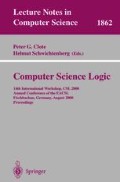Abstract
Entailment relations, originated from Scott, have been used for describing mathematical concepts constructively and for representing categories of domains. This paper gives an analysis of the freely generated frames from entailment relations. This way, we obtain completeness results under the unifying principle of the spatiality of coherence logic. In particular, the domain of disjunctive states, derived from the hyperresolution rule as used in disjunctive logic programs, can be seen as the frame freely generated from the opposite of a sequent structure. At the categorical level, we present equivalences among the categories of sequent structures, distributive lattices, and spectral locales using appropriate morphisms.
Access this chapter
Tax calculation will be finalised at checkout
Purchases are for personal use only
Preview
Unable to display preview. Download preview PDF.
References
S. Abramsky and A. Jung, Domain theory, in: Handbook of Logic in Computer Science, Vol 3, (Clarendon Press, 1995).
G. Birkho.. On the combination of subalgebras. Proc. Camb. Philos. Soc. 29, 441–464, 1933.
J. Cederquist and Th. Coquand. Entailment relations and distributive lattices. To appear in the Proceedings of Logic Colloquium 98.
Th. Coquand and H. Persson. Valuations and Dedekind Prague Theorem. To appear in the Journal of Pure and Applied Logic.
M. Droste and R. Göbel. Non-deterministic information systems and their domains. Theoretical Computer Science 75, 289–309, 1990.
M. Fourman, R. Grayson. Formal Spaces. in L. E. J. Brouwer Centenary Symposium (Noordwijkerhout, 1981), 107–122, North-Holland, Amsterdam-New York, 1982.
P. Johnstone. Stone Spaces. Cambridge University Press, 1982.
A. Jung, M.A.M. Moshier and M. Kegelmann. Multi lingual sequent calculus and coherent spaces. Fundamenta Informaticae, vol 37, 1999, pages 369–412.
G. Gentzen Collected Works. Edited by Szabo, Not-Holland, 1969.
V. Lifschitz. Semantical completeness theorems in logic and algebra. Proc. Am. Math. Soc., vol. 79, 1980, p. 89–96.
S. MacLane, Categories for the working mathematician. Springer-Verlag, 1971.
J.A. Robinson. The generalised resolution principle. Machine Intelligence, vol. 3, p. 77–93. 1968.
W. Rounds and G.-Q. Zhang. Clausal logic and logic programming in algebraic domains. Submitted. Copy at: http://www.cs.uga.edu/~gqz
G. Sambin. Pretopologies and completeness proofs. J. Symbolic Logic 60 (1995), no. 3, 861–878.
D. Scott. Completeness and axiomatizability. Proceedings of the Tarski Symposium, 1974, p. 411–435.
D. Scott. Background to formalisation. in Truth, Syntax and Modality, H. Leblanc, ed., p. 411–435, 1973.
D. Scott. On engendring an illusion of understanding. Journal of Philosophy, p. 787–807, 1971.
D. Scott. Domains for denotational semantics. in: Lecture Notes in Computer Science 140, 577–613, 1982.
M. H. Stone. The theory of representations for Boolean algebras. Trans. Amer. Math. Soc. 40, 37–111, 1936.
A. Tarski. Logic, semantics, metamathematics. Oxford, 1956.
G.-Q. Zhang. Logic of Domains. Birkhauser Boston, Inc., Boston, MA, 1991.
G.-Q. Zhang. Disjunctive systems and L-domains. 19th International Colloquium on Automata, Languages, and Programming (ICALP’92), Lecture Notes in Computer Science 623, 1992, pp. 284–295.
G.-Q. Zhang and W. C. Rounds. An information-system representation of the Smyth powerdomain. International Symposium on Domain Theory. Shanghai, China, October 1999. Copy at: http://www.cs.uga.edu/~gqz
Author information
Authors and Affiliations
Corresponding author
Editor information
Editors and Affiliations
Rights and permissions
Copyright information
© 2000 Springer-Verlag Berlin Heidelberg
About this paper
Cite this paper
Coquand, T., Zhang, GQ. (2000). Sequents, Frames, and Completeness. In: Clote, P.G., Schwichtenberg, H. (eds) Computer Science Logic. CSL 2000. Lecture Notes in Computer Science, vol 1862. Springer, Berlin, Heidelberg. https://doi.org/10.1007/3-540-44622-2_18
Download citation
DOI: https://doi.org/10.1007/3-540-44622-2_18
Published:
Publisher Name: Springer, Berlin, Heidelberg
Print ISBN: 978-3-540-67895-3
Online ISBN: 978-3-540-44622-4
eBook Packages: Springer Book Archive

